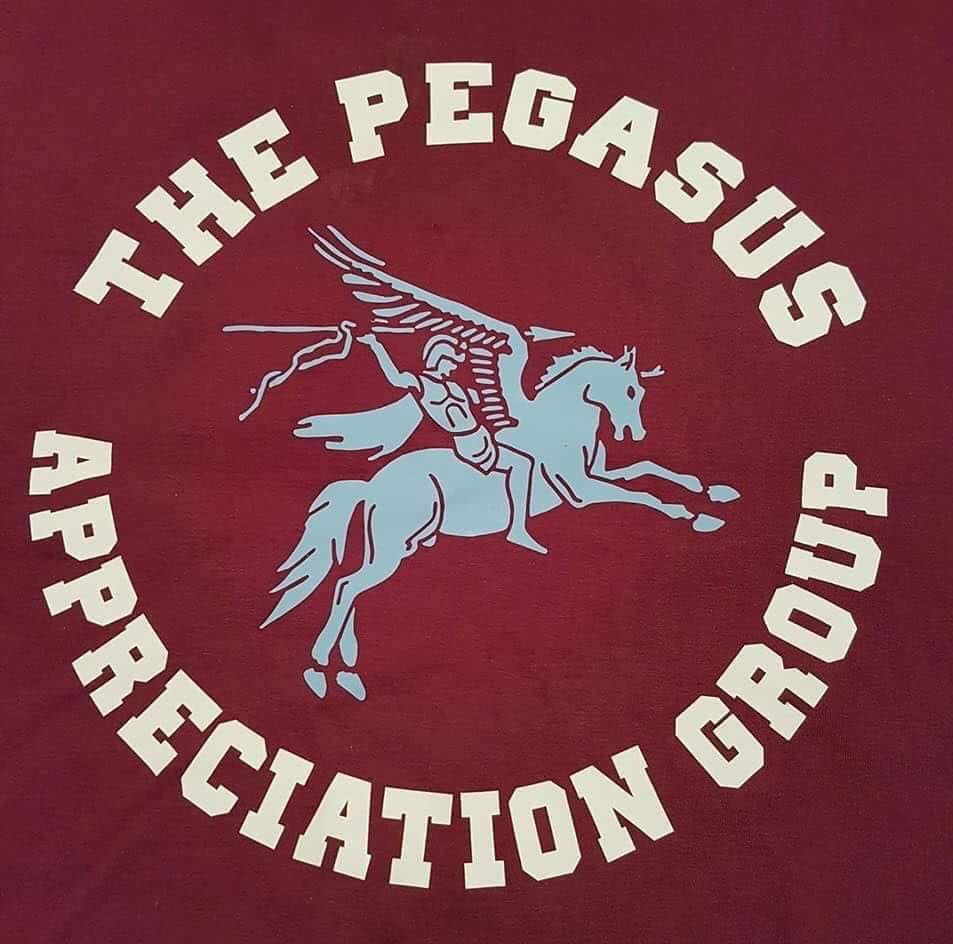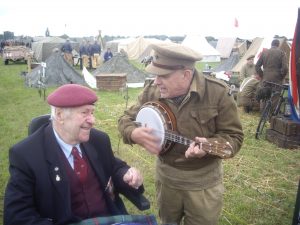
Gerry at the Cosby Victory Show, 2015
WHETHER we could call Gerry ‘typical’ of the men of the Battalion, I’m not sure, but his amazing life story is perhaps typical of the spirit and esprit de corps of all the brave young men of the 10th Battalion.
Born in 1922 into the chaos of post-WW1 Britain, Gerry was a London boy – probably a bit of a ‘street urchin’.
His Grandfather’s name was ‘Chevalier’, and it is true that this name is recorded in a Wimbledon census of 1914.
‘Chevalier’ is French for a ‘knight’ or ‘cavalier’ and it is likely that Gerry’s family emigrated to the UK from France in the 19th Century.
Colloquially, however, his grandfather was known as ‘Character’, and he owned and ran a laundry in North London.
With three or four-year-old Gerry at his side on the seat of the horse drawn laundry cart, he would often pull up outside the local pub, disappearing inside. After some considerable time and no sign of ‘Character’, the horse (whose name I do not know, but undoubtedly another character!) would move off, carefully returning little Gerry home without Grandad who would stagger back sometime (and several pints) later.
Genes run deep and long, and Gerry was also very worthy of his Grandad’s nickname – probably the most charismatic and greatest ‘character’ that any of us have ever met.
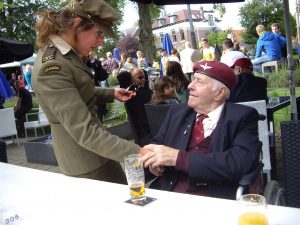
Oosterbeek, 2013
There was, of course, another side to ‘Gerry the showman, the entertainer’, which we would also see in Arnhem. The quiet sad contemplation, the bowed head and silent tears of grief for his fallen comrades and the terrible events Gerry witnessed in the 8 days he spent in the hellhole now famously known as The Battle of Arnhem.
Gerry had seen action previously – The Battle of El Alamein was certainly no picnic – but it was Arnhem that damaged, scarred and haunted these brave young men for the remainder of their days.
Becoming a ‘Tanky’
In 1939, Gerry lied about his age, he was actually only 17 when he volunteered and was  enlisted into the Royal Tank Regiment.
enlisted into the Royal Tank Regiment.
Typically, in true, Dad’s Army style, Gerry described his initial training thus; ‘I was given an air rifle and sat in a plywood mock-up of a tank turret from where I would fire pellets at toy tanks on the ground in front of me’.
During his tank training, at Bovingdon in Dorset, Gerry was in a truck headed for Warmwell, some ten miles away, to build a ‘dummy’ airfield to draw the Luftwaffe bombers away from the real facility at Bovingdon.
The truck was strafed by an enemy plane and crashed. Gerry ended with a broken shoulder and arm which was to trouble him until the end of his days.
Soon, deemed fit enough to return to duty, he found himself in a real tank as part of the British Expeditionary Force supporting French forces overrun by Hitler’s blitzkrieg.
Gerry, now at the ripe old age of 18, was evacuated from Dunkirk with more than three hundred thousand of his comrades. This was the second of Gerry’s survivals, somewhat like the proverbial cat’s nine lives, but the first of the three major events in WW2, which had huge global consequences and in which Gerry was involved.
By 1942, Gerry was now a fully-fledged ‘Tanky’ and his regiment, as part of Montgomery’s 8th Army, inflicted Britain’s first major defeat on Rommel’s Afrika Corps. Event number two; the hugely important Battle of El Alamein. A turning point and victory described by Churchill; ‘this is not the end. It is not even the beginning of the end. But it is perhaps the end of the beginning.’
It was also the third of Gerry’s ‘nine lives’. He was wounded when a German mine exploded beneath his tank, the remainder of the crew was uninjured. However, they were to tragically die together during the later stages of the campaign, their tank suffering a direct hit from a high explosive shell whilst Gerry was recovering in hospital.
In early 1943, recruiters for the new-fangled parachute regiments caught Gerry’s eye, especially the extra pay of ‘two bob’ per day! What also caught Gerry’s attention was the rumour that parachute training would be back in the UK, however, that was not to be, parachute courses and training were initially in North Africa and then in Kabrit in the Middle East. He joined the new 10th Battalion, which was comprised mainly of the remnants of El Alamein battle- savaged 2nd Royal Sussex.
Earning his wings
As part of 1st Airborne Division, 4th Parachute Brigade, the Battalion was trained and honed into an elite fighting force, Gerry was one of the ‘originals’, completing his jump training and earning his red beret (and extra pay) as early as March 1943.
In September, the Battalion was called into action as part of the seaborne invasion of Italy. In later years, though Gerry would call this a ‘picnic’ compared to Arnhem, the truth is that the Brigade came up against a very competent German Parachute Division who inflicted many casualties, some fatal.
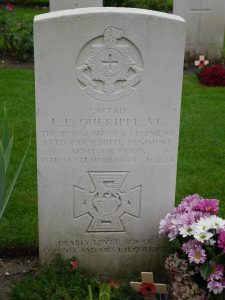
The grave of Captain Lionel Queripel VC, Oosterbeek Airborne Cemetery
Gerry was caught by the Germans foraging for ripe fruit in an Italian tomato field and taken prisoner. Even at his still young age, his irrepressible character must have already been forming as he told that (before his escape two weeks later) he was invited by a star-struck German officer to accompany him to the opera!
As 1943 ended, the Battalion returned to England, to a sleepy, bucolic Leicestershire/Rutland village called Somerby. This was to be their home and the scene of their many antics, loves and lives for 9 months prior to Arnhem. Gerry’s experience as a tank driver had singled him out to be in the MT section and he was duly given the job of ‘Driver’ to Captain Lionel Queripel.
Gerry and the captain formed a strong friendly relationship, way beyond officer and serving man, and – whilst the Captain was ‘courting’ the aristocratic young ladies of the stately homes and houses of Leicestershire – Gerry told of how he would be ‘entertained’ by the ‘below stairs’ staff!
Sadly, after leaving for Arnhem, Gerry never again saw the friend whose extreme courage earned him a posthumous Victoria Cross – one of the first ever awarded to a member of the Parachute Regiment. Until his death, he always claimed the loss as one of his personal tragedies.
Operation Market Garden
Operation Market Garden commenced on the 18th September 1944. Whilst the majority of the Battalion’s 582 men parachuted in, Gerry, his jeep and the rest of the MT section were flown in by glider. Despite predictions to the contrary, they landed in the middle of a full-blown battle, a very HOT landing zone. As a fully trained parachutist, Gerry hated landing by glider. Coming in under heavy enemy fire, it was highly likely that a crash landing would result in the crew being crushed by the jeeps and guns behind them even if they were not killed by bullets, flak or fire.
As he feared, the glider’s Dakota ‘tug’ was hit by anti-aircraft fire and had to be cast-off early. The Horsa glider dived so steep and fast that Gerry sat, terrified, with his back to the cockpit bulkhead facing the jeeps, which were now suspended and held to the plywood floor only by chains and shackles, convinced he was about to be crushed by the tonnes of machinery. Once again Gerry survived the crash landing and the subsequent firefight that accompanied the unloading of the glider.
Such was the chaos on the ground that much of the battle plan and orders were being constantly changed and even discarded. Gerry was never united with Captain Queripel or even his Battalion; instead being pressed into service as a makeshift ambulance under a white flag carrying the wounded (both British and German) from the battlefield to the various dressing stations (including the Schoonoord Hotel) and St Elizabeth Hospital
For four harrowing and relentless days, Gerry ran the gauntlet in what had become a bitter struggle
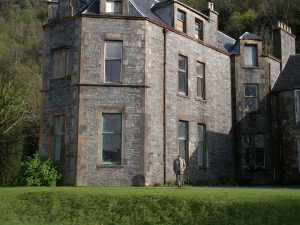
Gerry returns to Loch Ailort Castle after nearly seventy years.
of attrition between desperate forces. But on Thursday, his jeep was hit and disabled by a mortar. He now returned to the role for which he had been trained, finding himself amongst a mixed group of airborne forces dug in and defending the ever-shrinking British perimeter or ‘cauldron’ as the Germans called it.
Another four horrendous days passed before the order was given to withdraw to the Rhine. Gerry was late to reach the river, it was breaking dawn and the boats had gone. He launched into the mighty river, swollen by heavy overnight rain, a strong swimmer but showered by tracer and mortar he just managed to make the other bank. As he was helped ashore a mortar exploded. Wounded in the backside leaving the water, some of the shrapnel stayed with Gerry for the rest of his life and eventually led to problems and weakness in his legs in his later years.
Gerry’s war effectively now ended, orders were issued that the beleaguered Arnhem survivors were not to be returned to combat and Gerry was sent up to Scotland to Loch Ailort Castle for rest and recuperation. This stately Scottish hunting lodge was the Commando Special Training Centre, subsequently moved to Achnacarry Commando Basic Training Centre.
It later became the S.O.E (Special Operations Executive) Training facility, then taken over by
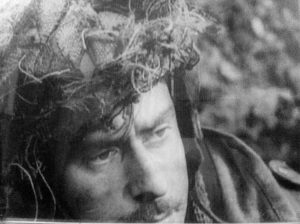
Gerry Dimmock, featuring in ‘Theirs is the Glory’ (1946)
The Royal Navy before ultimately the isolated home for survivors of Operation Market Garden. This was the start of his salmon fishing career, not however with rod and line but with hand grenades!
In 1945, a year after the battle, Gerry was amongst a small group of volunteers who returned to Oosterbeek and took part in the making of the feature film, ‘Theirs is the Glory’. What we would now call a ‘docudrama’ of the battle.
Although he got to drive a German Tiger tank as well as receiving a huge £3 per day from The Rank Organisation, his abiding memory was of great sadness. Especially seeing the large number of ‘our boys being dug up from their temporary graves to be re-interred in the new airborne cemetery…all you could see was a mass of feet sticking out of the back of lorries transporting the dead’.
The ‘post-war’ years
In 1946 Gerry was demobilised and settled down with his new wife, Joan and before long, daughters, Susie and Jackie arrived. From the stories that he told, life – although less dangerous than his war years – was hardly less exciting. The list of personalities that he came to know is no less than eclectic and extraordinary; from The Duke of Windsor, The Earl of Dudley, The Goons, in particular, Peter Sellers, whose children Gerry taught to ride, to the Kray Twins.
Gerry was the celebrated landlord of the Windmill pub in Chipperfield together with his pet fox often seen atop the bar supping at a pint!
Just after the war, the country was still rationed and chicken was not the ubiquitous dish it is today, but a rare and wonderful thing. Gerry lived close to the Ovaltine farm in Kings Langley, which (unbelievably) employed 1400 people and housed 50,000 chickens to produce eggs for the famous drink. The laying chickens were housed in long wooden sheds and Gerry – ex-Para and accomplished countryman that he was – figured out that during a dark moonless night, he could prise off one of the timber boards and release his pet ferret (on the end of a long leash) into the shed and retrieve a plump hen.
All went according to plan until the ferret made it into the pitch-black shed; all hell broke loose, chickens squawking and flying about, hitting the sides and roof with great thumps and artless flapping of wings, feathers everywhere. Gerry rapidly pulled the ferret back to him with no bird and scarpered very quickly back home. It suddenly occurred to him, the reason for the pandemonium, in the pitch darkness of the shed, the ferret was pure white!
Arriving back home he and Joan wife hatched a cunning plan; she would knit the animal a little jet-black woollen suit. A few nights later Gerry returned and the SAS black camouflaged ferret was fed through the crack in the board. Within seconds the little assassin had secured its prey and Gerry returned home with Sunday dinner.
Gerry told that it was his duty as a husband and father to place a decent Sunday meal on the table and for a long time afterwards he never failed in his duty.
The ‘Loveable Rogue’
We will never really know whether Gerry was as he said, ‘stitched up’ or whether he thought he could supplement his income by virtue of his association with some of the infamous London gangsters, but bags of swag were dropped at the pub and Gerry would ‘move them on’. He recalled an occasion when he was ‘visited’ by a couple of men from the Flying Squad. Whilst he was being interviewed he stood, half sitting on the back of his sofa, facing the officers, whilst unnoticed, on the seat of the settee was a selection of stolen silver.
Eventually, however, his luck ran out and he was convicted of receiving stolen goods and sentenced to six years in Wormwood Scrubs (The Scrubs), where he was sent out to labour on a local farm.
Over time, the likeable and charismatic Gerry, of course, became very friendly with the farming family so, when on arriving one day for work, he was horrified to hear that a barn full of straw was ablaze and that the farmer’s two children were trapped inside. Typically oblivious to his own safety, he wrapped his head in a wet towel and charged into the blazing barn to rescue the children. Gerry brought them both out, but tragically was too late and both children were dead. The tale of Gerry’s bravery ultimately reached the authorities and, incredibly, he was pardoned by the Home Secretary having served two of his six year’s sentence.
Scotland’s Mr Big.
Gerry came up to Scotland in the mid-1960’s and from very meagre resources began, with his second wife, Rene, his very successful fish smoking and restaurant business. This was a period of great happiness and contentment for Gerry and Rene, and their young son, David.
Gerry had one time shared a cell in the Scrubs with train-robber, Bruce Reynolds. Although Gerry always said that he had never met or had any connection with Ronnie Biggs and the rest of the infamous gang, it was rumoured among the locals of Newton Stewart that Gerry, himself, was ‘Mr. Big’ the mastermind behind the Great Train Robbery. Indeed, a local retired police officer was convinced that he had a lead to solve the famous ‘Crime of the Century’. The truth is sometimes stranger than fiction; so, who knows?
Looking back
In recent years Gerry once more turned his attention back to those memorable days in 1944. He returned to Arnhem and also back to Somerby for many commemorations always aided and accompanied by his great friend Major Chris Goddard, who at times also had to fulfil the role of ‘straight man’ as well as batman and driver, how Captain Lionel Queripel V.C. would have laughed to see the irony of Private Dimmock with an officer (one decorated with an MBE and Queens Gallantry Medal) as his driver!
Gerry died peacefully, aged 93, in hospital in his beloved Dumfries and Galloway in 2015. His funeral was a great and befitting event with representatives from today’s Parachute Regiment forming a guard of honour and last salute. A lone piper played the lament and a bugler, The Last Post. He is laid to rest in the beautiful little churchyard of All Saints Church, Challoch, Newton Stewart. Remarkably, this lovely church bears a striking resemblance to and the same name as All Saints Church, Somerby.
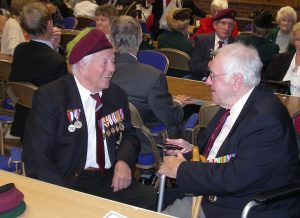
10th Battalion’s Jonny Stillwell and Gerry Dimmock, Somerby 2013
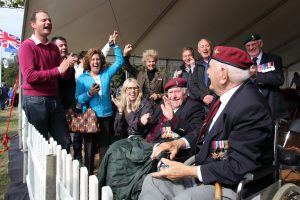
Harry Dicken’s birthday, Arnhem 2013
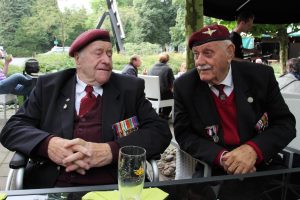
10th Battalion’s Gerry Dimmock and Harry Dicken at Arnhem, 2013







